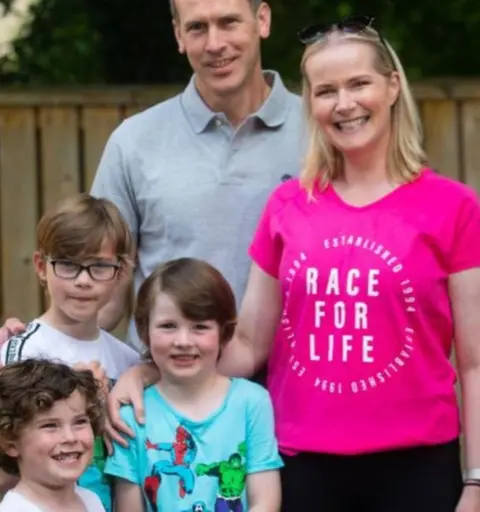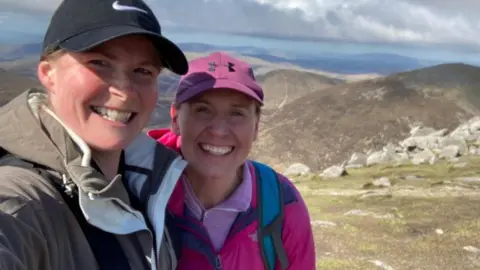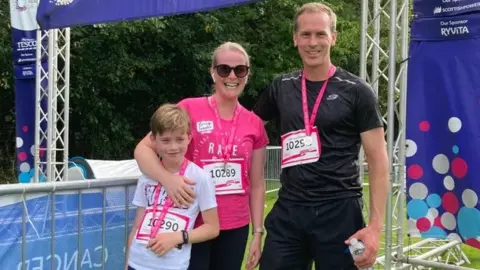Breast cancer: 'I knew my body wasn't right'
A Belfast woman who has terminal cancer has said her outlook is worse due to the 13-month delay to be diagnosed.
Lisa Smyth, 44, was diagnosed with advanced breast cancer in 2017.
The mother-of-three had noticed changes to her breasts after childbirth and raised her concerns a number of times. She told BBC News NI she had months of symptoms.
The Belfast Trust said it understood the distress Lisa and her family were experiencing following this diagnosis.
"We will contact Lisa to discuss any concerns she may have and to offer her and her family support at this time," the trust added.
Lisa's cancer has now progressed to metastatic breast cancer stage four, which means it has spread to other parts of her body including her lungs.
"I knew my body wasn't right," she said. "I should have been scanned from the start."
None of the Department of Health's targets for diagnostic testing which includes tests used for cancer were met, according to its latest figures, released on Thursday.
In March, 48% of patients commenced their first treatment for cancer following an urgent referral within the 62-day target.
The department target is that 95% of patients should begin treatment within 62 days after an urgent GP referral.
Speaking on Thursday, Health Minister Robin Swann said diagnoses for breast and bowel cancers were at pre-pandemic levels.
However, he warned that the lack of an executive limits his ability to act on waiting lists.
"Without a confirmed budget it makes it difficult for us to tackle the big issues," he said.


Consultant medical oncologist Martin Eatock said it was his impression they were seeing more patients with a later stage of diagnosis over the last 18 months to two years than they did prior to the coronavirus pandemic.
"For some patients it means that they have progressed to a stage where we are no longer able to offer them effective treatments," he said.
At the end of March, 156,270 patients in Northern Ireland were waiting for a diagnostic test - a rise of 13.9% compared to the same quarter the previous year.
These figures take in anyone waiting for a test for any reason and Northern Ireland's record is the worst in the UK.
Cancer Research UK identified eight of the tests included in the figures that are predominantly used for cancer, including gastroscopy, colonoscopy and MRI.
'Not to catastrophise things'
Lisa said getting diagnosed was "very difficult" and she had persisted for 13 months while pregnant and breastfeeding.
During that time, Lisa was seen by her GP surgery on three occasions and was given cream and antibiotics as it looked like mastitis (inflammation of the breast).
A referral to the breast clinic also diagnosed mastitis and the IT consultant was told a scan was not possible as she was breastfeeding.
"When I went back to the breast clinic the second time I said: 'This has been going on for 13 months please scan me, I am not leaving until I am scanned'."
A mammogram then an ultrasound found a 6cm tumour and cancer in 20 lymph nodes.
The cancer result was devastating for Lisa, her husband Simon and their three boys.
"My advice is to insist on a scan, no-one knows what is going on inside your body by just looking at you," she said.
"I should have been scanned from the start, I don't know why I wasn't - probably because I was pregnant and breast feeding."

Red-flagged gynae cancer
BBC News NI can reveal that in the Northern Trust area, the number of people being seen within 14 days for suspected gynaecological cancer has fallen significantly.
Gynaecological cancers include ovarian and cervical.
A freedom of information request showed that, in 2018, 49% of those referred were seen within target. In 2021, it fell to 13%.
The number of referrals seen within 15-28 days was 41% in 2018 and 27% in 2021.
In the Belfast Trust, 84% of patients with suspected gynaecological cancer were seen within target in 2018 and by 2021, it had fallen to 65%.
In the South Eastern Health Trust, the longest wait in 2018 for a red-flag gynae cancer referral was 48 days - fewer than five out of 1,962 patients waited this long.
In 2021, the longest wait was 108 days - fewer than five out of 2,195 waited this long.
In the Southern Health Trust the longest wait for a suspected gynaecological cancer referral was 12 weeks which affected five patients.
In 2021, the longest wait was 51 weeks - affecting five or fewer patients.

Mr Eatock said the lack of executive and political leadership means there is no impetus to apply Northern Ireland's new cancer strategy.
"Without political leadership, without a proper funding package for cancer and the cancer strategy it is difficult to see how the situation is going to improve any time soon."

Lisa said she will never know the difference the 13 months may have meant.
"I have been unlucky because I have an aggressive form of breast cancer, but lucky because it has targeted drugs and the tumours have all gone bar one which might be scarred tissue," she said.
"I don't know what is going to happen - that is just the reality of living with breast cancer. Might it progress? Yes, unless they find a cure for cancer within the next few years."

Lisa is a keen rower and continues with the sport for her physical and mental health - she climbed the seven highest peaks in the Mournes in one day shortly after learning the cancer had spread to her lungs.
Simon and Lisa have told the boys that "mummy is sick and has cancer".
Lisa said it was important to talk to children about cancer and to be completely honest.
"Jake who is nine and the eldest knows it has spread," she said.
"He does ask difficult questions like: 'Are you going to die?' I have to be honest and say we are all going to die sometime but hopefully not soon.
"It is better that they hear it from me and Simon and not in the playground and it's important not to catastrophise things."
